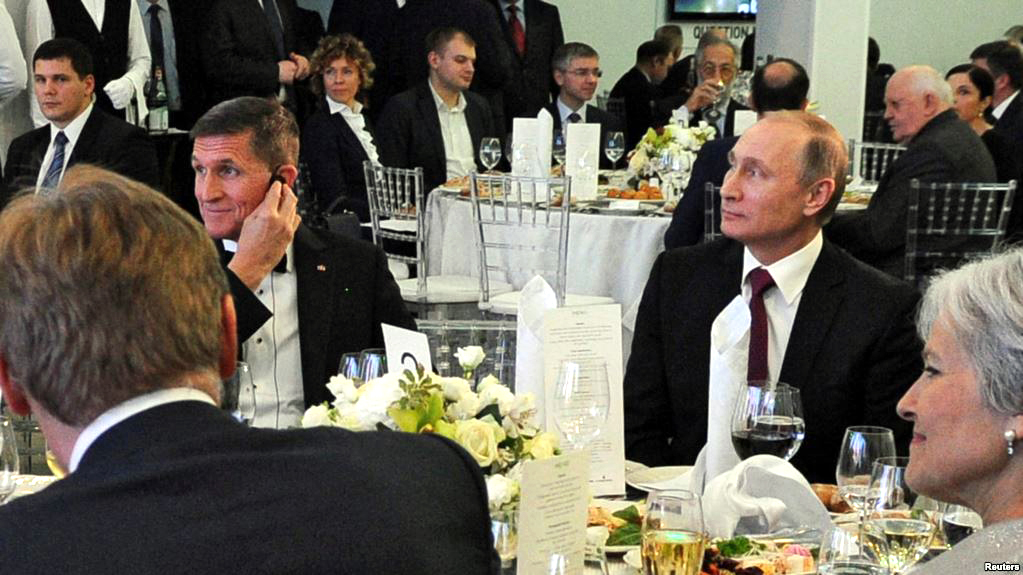Officially, the Kremlin has said the resignation of U.S. national security adviser Michael Flynn over allegations of improper contacts with Russia’s ambassador to the United States is an “internal matter” for Washington.
Unofficially, however, leading Kremlin-connected politicians and analysts have been nearly unanimous in attributing the resignation to nefarious efforts by U.S. “hawks” to derail a possible improvement in U.S.-Russian relations. They attribute the efforts variously to the “mainstream media,” the Democrats stung by freshly inaugurated President Donald Trump and his Republican Party’s electoral victories, the U.S. intelligence community, and Republicans they label as “Russophobes.”
Russian presidential spokesman Dmitry Peskov told journalists on February 14 that “we are not going to comment on this in any way…. It is not our business.” The Foreign Ministry issued a similar statement.
ALSO READ: Flynn Resigns Amid Questions About Talks With Russian Envoy
But top figures in Russia’s foreign-policy establishment outside the executive branch were actively commenting on the development, nearly unanimously arguing that the pressure on Flynn was really aimed at preventing warmer relations between Moscow and Washington.
Federation Council member Aleksei Pushkov, who was formerly the chairman of the State Duma’s Foreign Affairs Committee, posted on Twitter a photograph of the front page of the New York Daily Mail with the blaring headline: Russian For The Exit. He said it was a telling example of the “aggressive campaign by U.S. mainstream media” targeting “not Flynn, but relations with Russia.”
Pushkov’s successor heading the lower house’s Foreign Affairs Committee, Leonid Slutsky, told Interfax the same thing.
“A pretext was selected — [Flynn’s] contacts with the Russian ambassador, although this is a normal diplomatic practice,” Slutsky said. “In these circumstances, one comes to the conclusion that the target was Russia-American relations and undermining confidence in the American administration.”
Sergei Kislitsyn, a specialist in North American affairs with the Russian Academy of Sciences, also said contacts such as those between Flynn and Russian Ambassador Sergei Kislyak were “normal.” “If Flynn had been speaking with the British ambassador or the French, or whomever, there would not be so much attention,” he said.
Flynn, Kislitsyn said, “is just a victim of a struggle going on between Trump’s supporters and his opponents.” In general, he said, “anti-Russian rhetoric” is “a major problem” in the United States and will hamper any efforts to improve bilateral relations.
Federation Council member Konstantin Kosachyov, chairman of the upper house’s International Relations Committee, charged that in the United States “even a willingness to engage in dialogue with Russians is seen by the hawks in Washington as a thought crime (in the words of the immortal George Orwell).”
The pressure against Flynn, Kosachyov said, “is more than just paranoia, but something immeasurably worse.”
Flynn’s willingness to engage in dialogue with Moscow, Kosachyov said, “is definitely better than whatever is being pushed about Russia by [Republican Senator John] McCain and Republicans like him.”
McCain has been vocal in his warnings that Russian President Vladimir Putin cannot be trusted and staunch in his public defense of Russian neighbors like Georgia and Ukraine, each of which has territory outside its control due to Russian military invasion.
Vladimir Batyuk, an expert with the Institute of the United States and Canada, described the Flynn incident as “a very serious blow to Moscow’s trust in the new [U.S.] administration.”
“When Kislyak was communicating with Flynn, he was absolutely convinced he was communicating with a representative of Trump,” Batyuk said. “Now it turns out that this was not the case.” He argued that the loss of trust “will have negative consequences for the future of the Russian-American dialogue.”
The WikiLeaks website, which has been accused of being a tool of alleged Russian efforts to influence the 2016 U.S. presidential election in favor of Trump, tweeted an argument similar to that put forward by the Russian experts, saying Flynn resigned because of a “destabilization campaign by US spies, Democrats, press.”
The popular daily Moskovsky Komsomolets said the key issue in Flynn’s downfall was not his conversations with Kislyak but his participation in a gala celebration of Russian state broadcaster RT’s 10th anniversary in Moscow in 2015, sitting at the same table with Putin.
“It is hard not to remember the famous words of [18th-century] French Foreign Minister Talleyrand, who said of a similar situation in his day: ‘It was worse than a crime. It was a mistake.'”
Relations between Washington and Moscow have been particularly strained since Russia’s 2014 seizure of Ukraine’s Crimea region and its alleged active political and military support for separatists in eastern Ukraine.
Moscow was also irked after Washington adopted individual sanctions targeting Russian officials believed to have been involved in human rights abuses, the so-called Magnitsky List — named after whistle-blowing Russian lawyer Sergei Magnitsky, who died in police custody.
Trump campaigned on pledges to try to improve bilateral relations and work with Moscow to combat the threat from “radical Islamic terrorism.”







